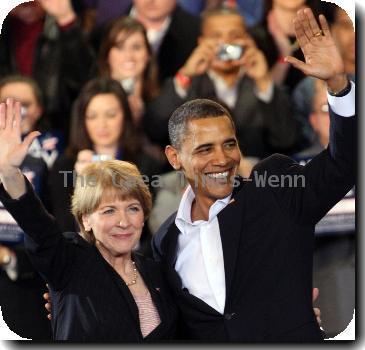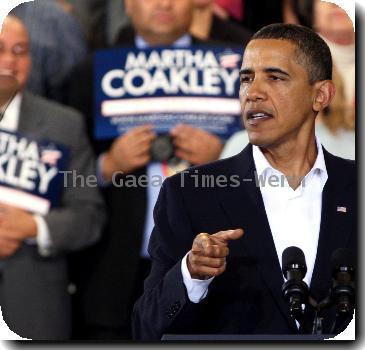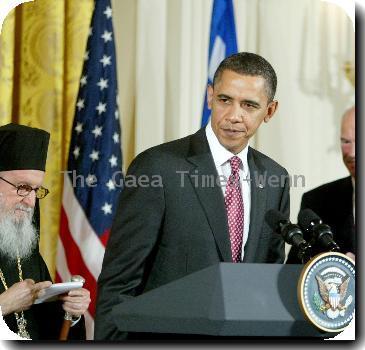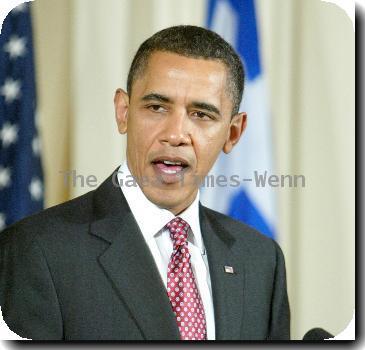Obama ratchets up pressure for financial overhaul, urges lawmakers to give him a bill quickly
By Tom Raum, APThursday, April 22, 2010
Obama slams Wall Street ways while asking support
NEW YORK — President Barack Obama rebuked Wall Street for risky practices Thursday even as he sought its leaders’ help for “updated, commonsense” banking regulations to head off any new financial crisis.
“Ultimately there is no dividing line between Main Street and Wall Street. We rise or we fall together as one nation. So I urge you to join me,” said in a high-stakes speech near the nation’s financial hub. His audience included some of the nation’s most influential bankers.
The president acknowledged differences of opinion over how to best protect bailout-weary taxpayers but denounced criticism from some Republicans who claim a Democratic-sponsored bill headed for Senate action would encourage rather than discourage future bailouts of huge banks.
“That makes for a good sound bite, but it’s not factually accurate. It is not true,” Obama said to scattered applause. “In fact, the system as it stands — the system as it stands is what led to a series of massive, costly taxpayer bailouts.” He said the overhaul legislation would put a stop to such bailouts.
Obama’s speech came at a delicate time in negotiations over the Senate measure, which could be debated next week. The House has passed its own version of financial overhaul legislation. Obama did not say which one he favored but told an audience that included dozens of financial leaders “both bills represent significant improvement on the flawed rules we have in place today.”
Obama portrayed his appearance at Cooper Union college, in lower Manhattan, as a reprise of a campaign speech he gave at the same location in March 2008 to offer an agenda for financial regulatory reform.
“Since I last spoke here two years ago, our country has been through a terrible trial,” he said, pointing to the loss of more than 8 million jobs, the losing of “countless small businesses,” trillions of dollars in lost savings and people forced to put off retirement or postpone college.
Taking his argument for stronger oversight of the financial industry to the city where the economic meltdown began, Obama said it was “essential that we learn the lessons of this crisis, so we don’t doom ourselves to repeat it. And make no mistake, that is exactly what will happen if we allow this moment to pass.”
Obama’s efforts to give the financial bill a personal push toward the finish line drew skepticism from his critics.
“The truth is, the American people have had enough of the federal government,” said House Republican leader John Boehner of Ohio. He said Obama-backed legislation “will enrich Wall Street at the expense of every other financial institution in the country.”
The U.S. Chamber of Commerce took out full-page ads in New York papers recognizing a need for reforms but criticizing provisions of the current legislation. “Mayor (Michael) Bloomberg has pointed out that beating up on Wall Street may be good short-term politics — but not if it gets in the way of right solutions,” the chamber said in its “Open Letter to the President.”
Bloomberg — who has expressed reservations over the overhaul legislation — was in the audience of about 700 financial industry leaders, consumer advocates, presidential advisers, local officials, students, faculty and others for Obama’s speech.
And Republican national chairman Michael Steele said the legislation would result in “piling on additional layers of job-killing bureaucracy that could add more instability to our financial markets.”
Obama spoke for about 25 minutes in the college’s Great Hall. The crowd response to his words was more polite than enthusiastic. But, he added, “Unless your business model depends on bilking people, there is little to fear from these new rules.”
Sponsors still held out hope that the Senate measure would draw some cautious Republican support. Senate negotiators say they had made progress toward a compromise bill that could command support from both sides.
At the same time, Senate Majority Leader Harry Reid, D-Nev., moved to set up a procedural test vote on Monday if bipartisan negotiations fail to yield an agreement. “The games of stalling are over,” Reid told reporters Thursday.
Obama’s speech was an effort to ramp up pressure on Congress. He also used it to take the financial industry to task. “A free market was never meant to be a free license to take whatever you can get, however you can get it,” Obama said.
He called on the financial leaders to tone down what he called “furious efforts” by an army of lobbyists to derail or water down the legislation. “I am sure that many of those lobbyists work for some of you,” he said.
The speech was given in the hall where Abraham Lincoln in February 1860 spelled out his position on freedom and slavery ahead of the presidential campaign that year. It also came just six days after the Securities and Exchange Commission’s fraud case against the huge investment bank Goldman Sachs.
Obama has denied any White House involvement in the timing of the SEC case, but the charges have emboldened Democrats in their criticism of Republicans who oppose the administration’s overhaul proposal — even though measures in the proposal may not have stopped the transactions involved in the Goldman case.
Goldman’s CEO, Lloyd Blankfein, was among those in the audience.
“I want to urge you to join us, instead of fighting us in this effort,” Obama told what he called the “titans of industry” in his audience.
The sweeping regulation proposal represents the broadest attempt to overhaul the U.S. financial system since the 1930s, and aims to prevent another crisis. It would create a mechanism for liquidating large, interconnected financial firms whose sudden collapse could shake the economy. At the height of the crisis in 2008, the Bush administration and the Federal Reserve provided billions of taxpayer dollars to prop up the giant insurer American International Group Inc., several banks and various financial institutions considered too big to fail. The moves were highly unpopular with voters.
The bills also, for the first time, would impose oversight on the market for derivatives — complicated financial instruments whose value is derived from the value of other investments. The measures also would create a council to detect threats to the broader financial system and establish a consumer protection agency to police consumers’ dealings with banks and other financial institutions.
Republicans contend that Democratic plans to create a $50 billion fund, paid for by the industry, to help unwind failing institutions would encourage Wall Street banks to take risks and to expect future bailouts. Democrats say the fund would lead to bankruptcy, not rescue. The administration does not support the fund and would not object to its being removed from the bill.
Senate Banking Committee Chairman Chris Dodd, D-Conn., and Sen. Richard Shelby of Alabama, the panel’s top Republican, have been trying to negotiate a compromise measure that could win GOP support.
Associated Press writers Jim Kuhnhenn in Washington and Sara Kugler in New York contributed to this report.
Tags: Barack Obama, Cooper union, Government Regulations, Industry Regulation, New York, New York City, North America, United States, Us-obama














